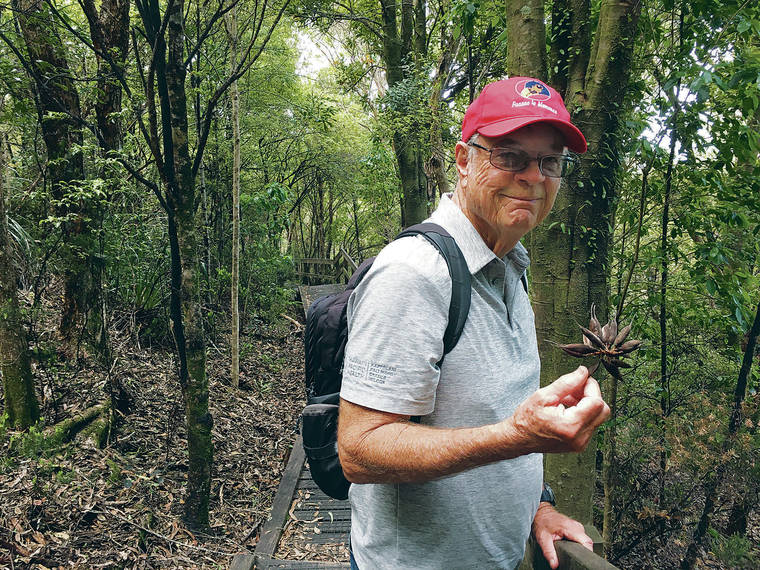University of Hawaii’s Art Whistler, ‘beloved by many,’ dies because of coronavirus

COURTESY ALICE CAMPBELL
Art Whistler posed for a photo while in Rangitoto, New Zealand, in October.
Art Whistler, a world-renowned botanist, a prolific author, a University of Hawaii adjunct professor, and an expert on the flora of the South Pacific, died Thursday after battling the coronavirus Opens in a new tab for more than three weeks. He was 75.
UH President David Lassner said in a statement Saturday that Whistler “will be sorely missed.” Whistler is one of four people to die in Hawaii from the disease.
“Art was well-known and beloved by many at UH as well as by the botany and conservation communities across Hawaii and the Pacific,” Lassner said. “He was a scientist, naturalist and educator who touched the lives of students, colleagues and communities throughout the Pacific.”
After earning degrees in California, Whistler served in the Peace Corps teaching in Samoa before moving to Hawaii, where he earned his Ph.D. in botany from UH- Manoa in 1979. Lassner said his research focused on the vegetation of Samoa.
Whistler was a lecturer and adjunct faculty member in UH’s Botany Department and with the Lyon Arboretum. He also held a post- doctorate appointment at the National Tropical Botanical Garden on Kauai and was a research affiliate at the Bishop Museum.
Through his consulting company Isle Botanica, Whistler worked on botanical projects across the Pacific Islands, including Samoa, Tonga, Fiji, the Marshall Islands and the Northern Marianas.
Don't miss out on what's happening!
Stay in touch with breaking news, as it happens, conveniently in your email inbox. It's FREE!
Angela Kepler, a Maui biologist and author who was friends with Whistler for more than 40 years, said he was highly respected for his work in Samoa, Tonga and the other islands of Polynesia.
Whistler was still active despite his age, traveling to Europe last year to visit museums and even going on a cruise in January from Honolulu to Australia, she said. He was also physically healthy, able to swim the length of a 60-foot pool without breathing, and playing tennis with his girlfriend, Alice Campbell.
Kepler said Whistler was a specialist in the plants of Samoa and Tonga, and knew the Samoan name for practically every plant, from the majestic ones down to the weeds.
She said Whistler had seen the pristine Samoan rainforests in the 1970s before mass tourism and logging, and he wanted to reclaim some of the traditional knowledge and uses of the plants for the young people in Samoa.
Kepler said Whistler’s greatest contribution was his work as an ethnobiologist, studying how people use plants, from purposes that are medical to cultural to practical.
Whistler wrote countless scientific articles and more than a dozen books, including titles such as “Polynesian Herbal Medicine,” “Tongan Herbal Medicine” and “Flowers of the Pacific Island Seashore.”
He was still working on his life-long project, a book that was nearly finished that would be entitled “Flora of Samoa,” a definitive resource on the country’s plants.
“He’s gone way before his time,” Kepler said.
Campbell said Whistler, who was fluent in Samoan, was known in that country as “Tupu o le Vao Matua,” or “King of the Forest.”
She said they met in Honolulu while he was working at Lyon Arboretum.
“He was amazing,” she said, adding they connected through mutual interests such as botany and gardening. “We were just a great team. I’m so lucky to have been in love with this man and he with me.”
Campbell, who lives in Alberta, Canada, last saw Whistler in February, when they worked in Whistler’s garden in Manoa and played tennis. She said Whistler was amazingly fit with the mind of a man a third his age.
“It just shows you the power of that disease and how indiscriminate it is,” she said.
She said Whistler was happiest among his plants and also was compassionate, once moving a bee that was struggling on a roadway to a shady spot under a plant.
She said he was on the quiet side, but would reveal himself on a hike, where he could share his knowledge of the flora.
She said Whistler contracted the disease in Washington state, where he was visiting his family, before feeling ill and returning to Hawaii in early March. He went to an urgent care clinic with symptoms of the coronavirus, but was given antibiotics and sent home. On March 7, he was taken by ambulance to Kaiser Permanente Moanalua Medical Center because of shortness of breath and tested positive for the coronavirus the next day. His condition, however, briefly seemed to improve.
Two days later, he was sedated and placed on a ventilator because he was not getting enough oxygen. He never regained consciousness.
Campbell said she called the hospital the day after Whistler was placed on the ventilator and the nurse told her Whistler’s last words before being sedated was to ask the staff to tell Campbell that he loved her.
“Those were the last words he ever spoke,” she said.
Whistler is survived by a sister on the mainland and his adult children, Sean in Seattle and Kira Matangi in New Zealand.



